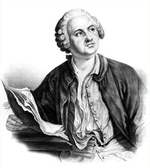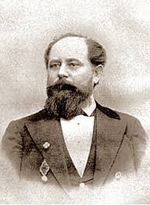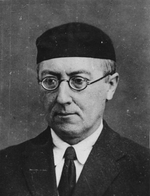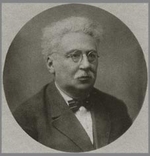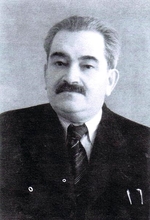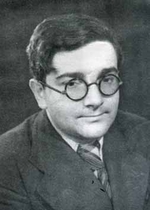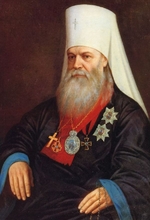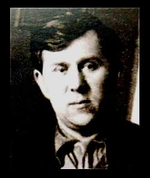Articles
Livshitz Isaak (1896–1970)
Livshitz Isaak (1896–1970) – Egyptologist, linguist, translator.
After a gymnasium in Nizhny Novgorod, he enrolled to the Medical Faculty of the Moscow University, but in 1919 he went to the Historical and Philological Faculty, In 1925, he graduated from the faculty of Social Studies of the Leningrad University and started to work at the Institute of language and Thought of the Ac. of Sc. of the U.S.S.R. under the leadership of N. Ya. Marr and I. G. Frank-Kamenetsky. He studied at the post-graduate courses in Egyptology. In 1936, he got his Candidate degree in Philology on the base of his works, without defense. Since 1948, he worked at the Leningrad Branch of the Institute of Oriental Studies of the Ac. of Sc. of the U.S.S.R., at the same time making lectures.
Read More
Lomonosov Mikhail (1711–1765)
Lomonosov Mikhail (1711–1765) – scientist and scholar, encyclopedist, physician, chemist, astronomer, specialist in mining, poet, historian.
In 1730, he went to Moscow from his native village of Denisovka (now vil. Lomonosovo) to get education. In 1731, he was enrolled to the Slavic-Greek-Latin Academy in Moscow. In 1734-1735, he studied at the Kievan Mogilyanskaya Academy, where he visited lectures in philosophy by Hieronymus Mitkevich. In 1736, he entered the Academic University in St. Petersburg; on October 4, the same year, he was sent to Germany, to Marburg – to study metallurgy. Till 1739, he studied there, visiting classes of H. Wolf in mechanics, and classes of J. G. Duizing in theoretical chemistry. In 1742, he became Adjunct of the physical class of the Ac. of Sc. and Fine Arts in St. Petersburg; and in 1745 – Professor of chemistry of the Academy.
Read More
Lopukhin Alexander (1852–1904)
Lopukhin Alexander (1852–1904) – Biblical scholar, theologian, translator, publisher.
After graduating from the St. Petersburg Theological Academy in 1878, he was sent as a psalmist to the church of the Russian Embassy in New York.
Upon his return in 1889, he published several essays on religious life in the United States and prepared the work ‘Roman Catholicism in America: A Study on the Current State and Reasons for the Rapid Growth of the Roman Catholic Church in the United States of North America’, (his Master thesis in Theology; St. Petersburg, 1881).
Having got that degree in 1883, he became Professor of the Department of Comparative Theology of the St. Petersburg Theological Academy; two years later, he received the Department of Ancient History, which he held until his death
Read More
Losev Aleksey (1893–1988)
Losev Aleksey (1893–1988) – philologer, specialist in classical studies, religious philosopher.
In 1911, after finishing a classical gymnasium in Novocherkassk with a golden medal, he enrolled to two departments of the Moscow University: Philosophy and Classical Philology (his Diploma composition was ‘The Worldview of Aeschylus’). In 1915, graduating from the University, he stayed there to prepare for the Professor degree. In 1914, he traveled to Berlin for educative purposes, but he had to return soon because of the war outbreak.
Since 1911, he visited the Religious and philosophical Society of Vladimir Soloviev; whe the society was closed, he went to the Free Academy of Spiritual Culture, founded by N. A. Berdyaev and closed in 1922. He was close to the Imiaslavie (Onomatodoxy).
Read More
Lozinsky Samuel (1895–1945)
Lozinsky Samuel (1895–1945) – historian medievalist, specialist in the history of the Papacy and Catholicism.
In 1895, after a gymnasium in Slutsk, he enrolled to the Kievan University, where his supervisor was Prof. I. V. Luchitsky. He participated in the revolutionary movement, was arrested, and later stayed under the police surveillance. In 1895-1897, he visited lectures at the University of Berlin. In 1899, he kept his studying in Brussels and Paris; in 1904, he graduated from the High School of Social Studies in Paris.
Read More
Lukachevsky Alexander (1893–1937)
Lukachevsky Alexander (1893–1937) – historian of religion and atheism, public activist, one of the leaders of the atheist movement in the U.S.S.R.
He was born in Petrozavodsk. Father - a retired soldier, ‘ranked among the little bourgeoisie’, Timofey Nikitich Lukachevsky, mother - Maria Mikhailovna, nee. Vasilyeva, a daughter of a tradesman from craftsmen, was 26 years younger than her husband. The family had three children. From his youth, L. took part in the revolutionary movement, he joined the Russian Social Democratic Party (Bolshevik) in 1920.
In 1920-1923, the Head of the Gubpolitprosveta in the city of Vladimir, from where he was sent to receive higher education in Moscow, at the Institute of Red Professors (1923-1926).
Read More
Lurie Solomon (1890–1964)
Lurie Solomon (1890–1964) – specialist in Classical philology, translator, historian-antiquarian, historian of science.
In 1909, having graduated from gimnasium in Mogilev with a gold medal, he entered the Classical Department of the Historical and Philological Faculty of the St. Petersburg University. After graduating fro it in 1913, he stayed at the same Department to prepare for an academic rank. From 1917 to 1919, Ass. Professor at the Petrograd University and employee of the Archive of the Revolution. From 1919 to 1920, Professor of the Department of the History of Greek Literature, Samara University. From 1921 to 1923, Professor of the First Higher Pedagogical Institute in Petrograd. In 1923-1925, Ass. Professor of the Faculty of Social Sciences of the Petrograd University; from 1925 to 1927, Ass. Professor, and then Professor (until 1929) of the Faculty of Linguistic and Material Culture of Leningrad State University.
Read More
Lurie Yakov (1921–1996)
Lurie Yakov (1921–1996) – historian of Russian culture.
From 1937 to 1941 he studied at the Historicak Faculty of the Leningrad State University. In 1942, he defended his Ph.D. thesis on the history of Russian-English relations in the epoch of Ivan the Terrible at the Tomsk State University. From 1942 to 1945, he taught at various universities, mainly provincial ones. In 1945-1949, Lecturer at the Leningrad Pedagogical Institute named after A.I. Herzen. In 1949, he was fired out during the campaign ‘against cosmopolitanism’. From 1953 to 1957, Junior Researcher at the Museum of the History of Religion and Atheism of the Academy of Sciences of the U.S.S.R.
Read More
Macarius Metropolitan (Bulgakov Mikhail Petrovich) (1816–1882)
Macarius Metropolitan (Bulgakov Mikhail Petrovich) (1816–1882) – Orthodox theologian, ecclesiastic historian, hierarch of Russian Orthodox Church.
In 1831, he graduated from the Belgorod Spiritual School; in 1837 – the Kursk Spiritual Seminary; in 1841, he got his Master degree in Theology at the Kievan Spiritual Academy and became monk. Doctor in Theology (1847) for the thesis ‘Introduction into the Orthodox Theology’. In 1843. the Most Holy Synod granted him the rank of Ass. Professor in theology. In 1844-1857, he taught at the St. Petersburg Spiritual Academy; in 1851 – Rector. In 1851, he also became Bishop of Vinnitsa. In 1862 – Archbishop; since 1879 – Metropolitan of Moscow and Kolomna, member of the Most Holy Synod.
Read More
Makariev Stepan (1895–1937)
Makariev Stepan (1895–1937) – ethnographer, specialist in the culture and religious beliefs of Onega Vepsians.
He was born in vil. Podshchelie of the Voznesensk District, St. Petersburg Region in a peasant’s family of Onega Vepsians. At the WWI he fought at the Western Front; he took part in the Civil War – in the Red Army. In 1927, he graduated from the Ethnographical Dep. of the Geographical Faculty of the Leningrad State University, where his supervisor was V. G. Bogoraz. After it, he worked at the University as a secretary of the Ethnographical Dep. In 1928, he became Director of the Karelian State Museum of Local History.
Read More
Showing 161-170 of 351 items.


